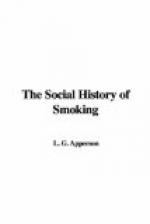Although smoking was general among parsons, yet attacks on tobacco were occasionally heard from pulpits. A Lancashire preacher named Thomas Jollie, who was one of the ministers ejected from Church livings by the Act of Uniformity, 1662, has left a manuscript diary relating to his religious work. In it, under date 1687, he mentions that he had spoken “against the inordinate affection to and the immoderate use of tobacco which did caus much trouble in some of my hearers and some reformation did follow.” He then goes on to record two remarkable examples of such “reformation”—examples, he says, “which did stirr me up in that case more than ordinary. The one I had from my reverend Brother Mr. Robert Whittaker, concerning a professor [i.e. a person who professed to have been “converted”] who could not follow his calling without his pipe in his mouth, but that text Isaiah 55, 2, coming into his mind hee layd aside his taking of tobacco. The other instance was of a profane person living nigh Haslingdon (who was but poor) and took up his time in the trade of smoking and also spent what should reliev his poor family. This man dreamed that he was taking tobacco, and that the devill stood by him filling one pipe upon another for him. In the morning hee fell to his old cours notwithstanding; thinking it was but a dream: but when hee came to take his pipe, hee had such an apprehension that the devill did indeed stand by him and doe the office as hee dreamed that hee was struck speechless for a time and when hee came to himself hee threw his tobacco in the fire and his pipes at the walls; resolving never to meddle more with it: soe much money as was formerly wasted by the week in to serving his family afterward weekly.”




